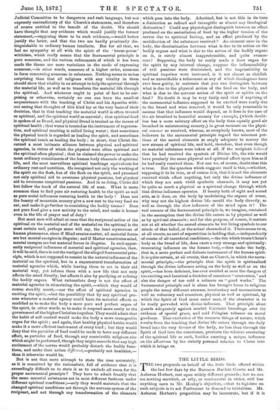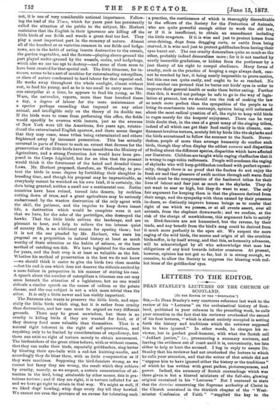THE LITTLE BIRDS.
THE two proposals on behalf of the little birds offered within the last few days by the Baroness Burdett.Coutts and Mr. Auberon Herbert, rest upon widely different grounds ; but we can see nothing mawkish, or silly, or sentimental in either, still less anything open to Mr. Henley's objection, —that to legislate on such subjects is to ask Parliament to descend to trivialities. Mr. Auberon Herbert's proposition may be inaccurate, but if it is
'The Baroness also wants to preserve the little birds, and espe- cially the little birds which sing, but it is rather from cruelty than destruction, and her case must be argued on very different grounds. There may be great unwisdom, but there is no cruelty in killing birds if they are wanted for food, or if they destroy food more valuable than themselves. That is a natural right inherent in the right of self-preservation, and requiring only to be limited by considerations of expediency, but there can exist no right of torture merely to obtain amusement. The birdcatchers of the great cities believe, with or without reason, that they can make their birds, especially goldfinches, sing better by blearing their eye-balls with a red-hot knitting-needle, and accordingly they do blear them, with as little compunction as if they were machines. Supposing the bird-fanciers wrong, as we cannot but fancy they are wrong, the result which they achieve by cruelty, namely, as we suspect, a certain concentration of at- tention in the bird, being attainable by other means, this is gra- tuitous torture ; and if they are right, it is torture inflicted for an end we have po right to attain in that way. We might as well, if we liked dogs' bowling, whip doge every day till they howled. We cannot see even the pretence of an excuse for tolerating such , a practice, the continuance of which is thoroughly discreditable to the officers of the Society for the Protection of Animals, who are quite powerful enough either to work the old law, or if it is insufficient, to obtain an amendment including the little songsters. If it is wise and just to protect horses from over-driving, dogs from dragging carts, or cattle from being starved, it is wise and just to protect goldfinches from having their eyes burnt out. The one cruelty demoralises quite as much as the other, probably indeed demoralises more; for it is not reached by nearly insensible gradations, or bidden from the performer by a just theory of his right to compel obedience. Many forms of cruelty, such as the practice of keeping a cage always dark, can- not be reached by law, it being nearly impossible to prove motive, but this one can quite easily, and ought to be so reached. No bird-catcher can pretend that he burns out birds' eyes in order to improve their general health or make them better eating. Further than this, it would not perhaps be safe to go in the way of legis- lation at present, lest we should run the risk of making the law so much more perfect than the sympathies of the people as to bring its enactments into contempt, opinion being still unformed about the most radical question of all, the right to keep wild birds in cages merely for the keepers' enjoyment. There can be very little doubt that, in the case of a great many of the singing tribes, indeed of all which can get their food easily in this climate, con- finetnent involves torture, acutely felt by birds like the skylarks and the birds accustomed to follow the summer to the South. Never- theless, people of more than average humanity do confine such birds, though they often display the oddest nuances and disparities of feeling about the different species, disparities which have affected our literature. Children are taught while caging chaffinches that it is wrong to cage robin redbreasts. People will condemn the caging of skylarks who will keep goldfinches confined with perfect equani- mity, though there is no proof that the finches do not enjoy the fresh air and that pleasure of swift motion through soft warm fluid which must be the compensation of the feathered tribes for their lives of labour and fear just as much as the skylarks. They do not want to soar so high, but they do want to soar. The only fair argument for keeping them is that the pleasure derived from their songs, and the sympathy with them caused by their presence in-doors, so distinctly improve human beings as to confer that right of use which we possess, or at all events assert, over all animals, from the elephant downwards; and we confess, at the risk of the charge of mawkishness, this argument fails to satisfy us. Bird-fanciers are not humanised, but the reverse, by their trade, and any benefit from the bird's song could be derived from it much more perfectly in the open air. We suspect the mere caging of the wild birds, the source and origin of all the cruelties birds suffer, is by itself wrong, and that this, as humanity advances, will be acknowledged by all who acknowledge that man has obligations of any kind towards inferior creatures. At present, however, opinion has not got so far, but it is strong enough, we conceive, to allow the Society to suppress the blearing with red- hot irons of the goldfinches' eyes.



































 Previous page
Previous page